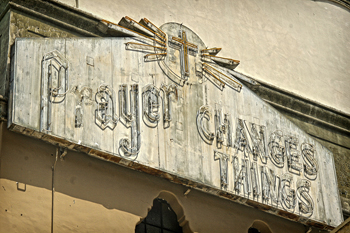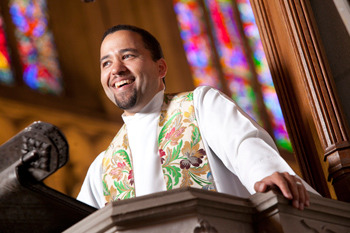Editor’s note: Faith & Leadership offers sermons that shed light on issues of Christian leadership. This sermon was preached at the ordination of Jane A. Stanley on Aug. 12, 2012, at Greenfield Christian Church (Disciples of Christ) in Greenfield, Ind.
Well, Jane, you made it. You kept before you a calling, you persevered through challenges, you engaged both your seminary studies and the ordination process, and you made it. And when I say you made it, what I mean, of course, is that you made it to another beginning.
To this point, everyone from family members to professors to pastors to members of congregations to strangers on the street have offered you words for your ministry -- exegesis, administration, salvation, ecclesiology, wisdom, self-care, context, authenticity, spirituality, and a whole host of others. I bet that if you stopped to think about all the words you have been given over the last few years, you would wonder how you have found room for them all.
I don’t have to tell you that in your next ministry setting, people there will be eager to give you more words. They will be stopping by all the time, calling you, emailing you, texting and tweeting you, with more words for your ministry -- budget, visitation, hymns, staff, plumbing, intensive care, baptism, divorce, just to name a few.
That’s why I really wanted to give you something different on this great day, something other than what you already have too many of, but the more time I spent with this story from Luke 9, the more certain words emerged. So, as unoriginal as the gift is, count these words as a present given in prayer and appreciation for the journey thus far and for the ministry that lies ahead.
But first, because we just might hear this reading differently on a day like today and in a time such as this, let’s note a couple of things about the story itself. Doing so may help us see why I am giving you these words instead of others.
The first is the reminder that we are followers of Jesus before we are leaders in Christ’s church. We are Christian before we are clergy, and then, hopefully, while we are clergy.
You are being ordained today in the congregation where you were baptized. That is special indeed. It may also prove helpful. There may be moments in your ministry when your ordination will get out ahead of your baptism, when the call to pastoral leadership will skew and even subvert your first commitment of following Jesus. You will know if that happens. Your priorities won’t be as clear, your ministry will feel more like middle management, and you will not have a sufficient interior, spiritual life to support the exterior pastoral life.
If that time comes, then circle back around. Get back in touch with what it means to be a follower of Jesus first, a learner of the Way, so that you can remember and reclaim what drew you to ministry in the first place. You might even want to come back to this sanctuary if such a dry and confusing stretch presents itself, but if you do, don’t pick the place where you will kneel today -- at least not at first. Go instead to a favorite pew and allow the songs of faith to reverberate within you. Or make your way to a Sunday school room where the old, old story always catches you off guard with its newness. Or go stand with the faithful in the fellowship hall and feel the love of God in every handshake and every hug. Or go lean against the side of the baptistery and run your fingers through the life-giving water.
We are followers in the Way so that others can see the Way in us, and if they see the Way in us, they may well be receptive to what we have discovered and experienced. They may even be open to allowing us to show them the Way on occasion.
The second thing that stands out in this passage is that, for all the mind-boggling differences between the world of first-century Palestine and our world, you are being ordained at a time when the church in this country has a better appreciation of the margins on which those early disciples lived.
The early disciples did not occupy places of prestige, power or privilege. They were on the margins of the religious and political landscape of the day. As incredibly difficult as that life was in many respects, it also meant that they were freer. They were not being propped up by the Roman Empire, at least not yet. They weren’t the mouthpieces of the local policymakers.
Even though many churches today are still located at the center of cities and towns, most of the church in this country does not enjoy the social prominence that it once did. It may be that we are paying the price for having become too comfortable at the center, too indistinguishable from the other players at the center of a community.
Too often, our message of God’s love and justice for all people -- no exceptions! -- became so diluted and distorted that many congregations took on the same prejudices, injustices and disparities that prevailed in the local culture. Billy Graham once said that his biggest regret was that he too closely aligned the gospel with national interests and that the gospel got shortchanged every time.
These days the church in this country generally is not propped up by the culture, or the government, or the financial industry, or the educational system. The lack of social prominence could be construed as discouraging news for the church, but the bright side to this is that we are now freer to share the heart of the gospel as we know it to be. Less encumbered by social and political trappings, the church’s witness will be livelier, more inclusive, more joyful, and far more compelling.
So with those thoughts about Luke 9 in mind, it’s time to give you three more words for your ministry. The first one is clarity. It’s not a particularly religious or ministerial-sounding word, but it will help you sort through all your other words.
Clarity. Jesus gave the disciples clear instructions about what their ministry would involve. They were to proclaim the realm of God and to heal.
Through the reflection and introspection of seminary and the Nurture and Certification process and other opportunities, you have gained more clarity about who you are and who you aren’t, about your gifts and your vulnerabilities, about what excites you and what haunts you. Personal clarity -- that’s an important start.
There’s also pastoral clarity. There’s a good bit an M.Div. does not prepare you to do. In every congregation I served, there were people who knew more about furnaces, copiers, workers’ comp, counseling techniques, and a whole host of other things than I did. Those are important matters. Let those with knowledge and skill in those areas have the time of their lives taking care of those things.
You will have important matters of your own. An M.Div. hopefully does prepare you to be an interpreter of God’s presence and purposes, to articulate a set of guiding faith commitments, and to help a congregation translate those commitments into specific ministries. When there is pastoral clarity, there is a greater chance of congregational clarity.
A lot of situations in the world cry out for healing while the church shuffles its bylaws, tends to the boiler and keeps discussing agenda items from the previous decade. In your ongoing study and prayer, become clear about what you believe God desires for the world and then align the time and priorities of your ministry with God’s purposes. Clarity.
The second word is agility. Jesus built in agility when he told the disciples to go without staff or bread or money or even an extra tunic. He even told them there may be difficult encounters that will require a quick pivot toward a new venue for ministry. Agility.
On a recent mission trip to rehab houses in an underserved area, 30 teenagers slept at a nearby church. On their first night there, a member of the church strolled into fellowship hall, made his way to a telephone that hung on the wall and posted a sign that read, “No Long-Distance Calls.”
It was an act of stewardship, I’m sure, but think about that for a second and imagine what those teenagers were doing at the time. At least 15 of them -- fully half the group -- were capturing on video via their smartphones the man posting the sign. By the time he walked out of the room, friends and family 600 miles away -- though it could have been anywhere in the world -- were also watching the man post the sign. By the way, you could hear the other half of the group asking, “What’s a long-distance call?”
Change has always been present, but its pace has picked up greatly. Agility, though, is not just for technology’s sake.
Ministry these days depends on a nimbleness with a wide variety of questions and circumstances. How many paths are there to God, and are all of them equally valid? How will the shifts in our neighborhood or town impact our church? Who can and cannot be married? Will you help me be both spiritual and religious? Why does my child have this disease?
These questions and others like them pulse through the church and society every day. They call for pastoral agility that is grounded in the Christian story yet conversant with a wide range of voices, able like an iPad to hold many windows open at the same time and to move nimbly between the important congregational conversations that are going on at any given moment.
And the third word is proximity. Jesus didn’t say, “Go set up a booth somewhere, and if people stop by, do what you can for them.” He didn’t lead them into the temple but sent them into the world. “Take the good news to the villages,” Jesus said.
A lot of congregations are sitting back, still waiting on people to come to them, tending only to their own well-being and focusing increasingly on their own survival. And a lot of ministers wait around day after day in comfortable offices and studies, overseeing the status quo, keeping absurd matters running smoothly and waiting on questions and issues to come to them, but by the time the really important issues penetrate the respectability and busyness of the church, they have already been settled, and people have moved on to other things.
A few years ago, some people started talking about what it means to be missional -- missional congregations, missional leaders, missional regions and conferences and denominations. This is how caught up in ourselves the church has become at times. When people started talking about being missional, much of the church was so inwardly focused that it sounded like a new idea!
But in today’s reading we are reminded that being sent to engage the world around us is at the heart of the Christian story from the beginning. We have always been the “sent,” sent toward the action, sent toward possible partners, sent toward what claims us, sent toward the new world God has proposed. “Just as I have been sent,” Jesus said, “so I send you” (John 20:21).
We are called to look always to the growing edge, as Howard Thurman said. Old worlds are dying every day and new worlds are being born. Look to the growing edge. More than that, go and stand at the growing edge, point it out to the rest of us, and call us to engage what is emerging, so that we can help shape its character and its possibilities.
You are being ordained to give witness to the hope and healing God desires for all the world. To do that, you will need proximity to the opportunities as well as to the pain that exists not very far beyond the doorsteps of the church.
Clarity, agility, proximity.
Just some words for your ministry. But if they were important when the disciples were beginning their ministry, you might take them along on your journey, too.














